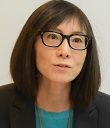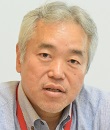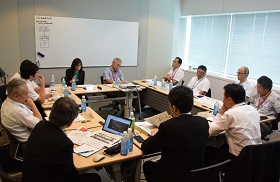Archived content
NOTE: this is an archived page and the content is likely to be out of date.
FY 2016 Stakeholder Dialogue Session
Enhancing Business Management through Dialogue with Outside Experts
Aiming to reflect the opinions of diverse stakeholders in business management, the Fujitsu Group regularly invites outside experts to participate in dialogues with its senior management team. Recently, we hosted a lively discussion about how best to use technology to contribute to sustainable development and ensure the Company's continued growth.
Dialogue Session 1: Recognizing Challenges in Business
Experts:
| Ms. Atsuko Kamegaya, | Senior Vice President and Partner, Fleishman-Hillard Japan K.K. | |
| Mr. Osamu Kurume, | President, Consam Co., Ltd |
Fujitsu:
| Mr. Yoshikuni Takashige, | Vice President, Marketing Strategy Office | |
| Mr. Fumihiko Otsuki, | Senior Expert, Social Innovation Promotion Dept., Innovative Solution Business Division, Financial Service | |
| Mr. Ken Yoshino, | Senior Director, Global Business Division | |
| Mr. Masaru Uchida, | Manager, Development Dept. III, Application Management Middleware Div. | |
| Mr. Fumio Honda, | Deputy Head of Unit, R&D Strategy and Planning Unit, Fujitsu Laboratories | |
| Mr. Takafumi Ikuta, | Senior Research Fellow, Economic Research Center, FRI | |
| Mr. Akihiro Yoshida, | Director, CSR Promotion Office
Head of Unit, Corporate Affairs & Risk Management Unit |
* Positions and titles of participants are as at the time the dialogue was held.
 Ms. A Kamegaya Ms. A KamegayaSenior Vice President and Partner, Fleishman-Hillard Japan K.K |
 Mr. O Kurume Mr. O KurumePresident, Consam Co., Ltd |
Kamegaya: Our company defines communication as "The power to move others to act through messages". Communication becomes meaningful only when a company assumes a presence that has value for society as a whole or for counterparts, or when it is able to engage with counterparts. In order to effectively convey its initiatives on the Sustainable Development Goals (SDGs)*1, Fujitsu must define the type of company it aims to become, and its strengths, and then – through a business model that makes practical use of those strengths – clearly elucidate the value it can provide in various areas.
Kurume: In March, I left Fujitsu and started up a company. While at Fujitsu I thought I was taking a customer-centric approach to my work, however, looking back now I can see that I actually tended to take a product-focused approach. What clients want is not vendors to support business, but partners who work with them to build their businesses. I now operate in a consulting capacity, not from the viewpoint of "where to apply specific product features", but rather as a true consultant adopting the user's perspective.
Takashige: I feel it is necessary to make strategic decisions regarding which areas to focus on and through clear communication have this permeate through the entire organization. It is also necessary to perfect solutions so that they can be used by anyone and deployed globally. I hope we can consider these issues from both top-down and bottom-up approaches, to make optimal use of the tremendous freedom we enjoy, which is one of Fujitsu's advantages.
Kamegaya: Companies outside Japan are logically linking their past business pursuits to their future vision and are actively engaging in discussions. In addition, they are giving signals about the direction they are heading in and the value their company will be creating as they move forward.
Otsuki: We are currently considering how best to share the company's true value with the world. However, because we are in a transition period where business models are changing, this makes it difficult for us to nail down what the company should look like. Despite such challenges, we still need to share this sense of Fujitsu self-awareness, in light of the SDGs, and use the same words to convey this both externally and within the company.
Yoshino: We are striving to boost business opportunities overseas to drive further business expansion. If we had more human resources who could deal with challenges from a problem-solving perspective without being bound by existing organizational structures, surely this would lead to the scaling up of businesses designed to solve social issues.
Kurume: At Fujitsu there is a very customer-centric, front-line, hands-on approach. However, it is necessary to wade in even deeper by putting yourself even more firmly in the other person's shoes when creating business offerings. It is not necessary to build in every function as solutions that are accessible and highly versatile will be seen as user-friendly in Asia and elsewhere.
Uchida: We can globally deploy the products we are responsible for, but the real challenge is to expand this global approach to the services business. Dealing with social issues is important, but it is also essential to establish evaluation mechanisms that will raise the awareness needed to tackle such challenges.
Ikuta: The imperative to resolve social issues and measure their impact is growing daily. I envisage that it will become key in the future to evaluate business activities from the perspective of the benefits to society in addition to a company's profits. If we embrace SDGs as something that can help us to deliver on expectations, rather than a just necessity for doing business, then that opens up the way for thinking more broadly about what our company can do.
Honda: The role of our laboratories is to identify the technologies required for achieving the SDGs and to bridge the gap between current and future capabilities. As Fujitsu's business model undergoes change, in the context of the SDGs I want us to be mindful of the direction the laboratories are aiming to move towards.
Yoshida: We need to think about ways to apply Fujitsu's specialist skills in key areas by having a flexible mindset while also emphasizing an "outside-in" perspective with an understanding of society's expectations and demands.
Kamegaya: It is necessary to define the set of concepts that encapsulate Fujitsu's identity, qualities and strengths. Generalizations are not enough to form a solid vision. A clear understanding is needed of the customer's business environments and the challenges they will face in the future. It is also critical to show through messages and actions the value that can be provided in specific areas, making practical use of Fujitsu's strengths to solve these challenges.
Kurume: A host of new players from completely different industry sectors are now targeting potential customers like never before, in key business areas such as Fintech. To keep up with this competition it will be crucial to go forward with a renewed sense of urgency.
[Summary of Session 1]
As part of its management strategy, Fujitsu has positioned itself for global development and expansion. How can the company generate maximum value in keeping with the many demands and expectations of society? We hope that this discussion will link with future dialogue sessions and also tie in with Fujitsu's policy-development process.
Note:
*1 Sustainable Development Goals (SDGs)
The Sustainable Development Goals are the 17 goals, with 169 targets, to be achieved by 2030, which have been set as a universal call to action to ensure the prosperity of both the world's people and the planet itself. United Nations member nations will strive from 2016 to 2030 to attain sustainable development by meeting these various goals on poverty and hunger, energy, climate change, and the creation of peaceful, prosperous societies.
Scene from Session 1

